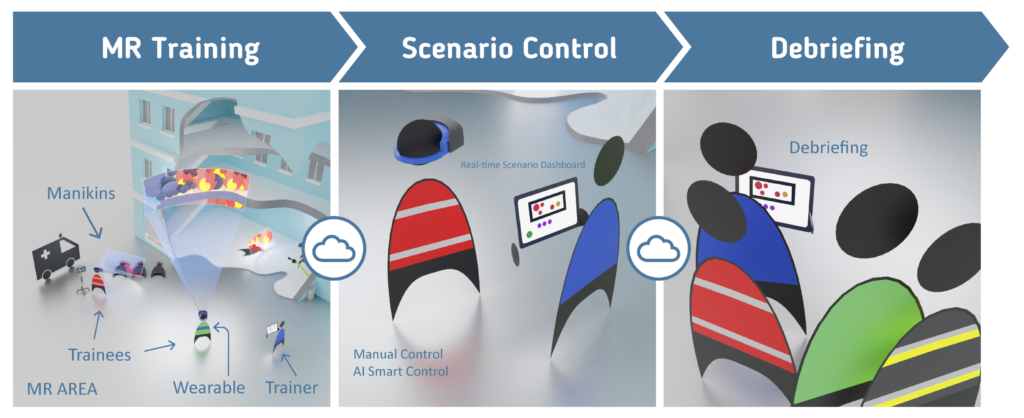Objectives
The main aim of MED1stMR is to better prepare MFRs for stressful and highly complex disasters situations by developing a new generation of MR training with haptic feedback for enhanced realism. Therefore, the project pursues the following pioneering objectives. All objectives will strongly support and enhance the capabilities of medical first responders to be better prepared for rescuing people and saving lives in actual and especially for future challenges.


Objective 1: Developing a pioneering MR training approach for enhanced realism
The project will integrate patient simulation manikins and medical equipment into virtual environments to offers realistic training through a much richer sensory experience. This will bring virtual training closer to reality, enabling both scenario training and medical training in the same MR scenario. This MR training environment allows trainees to immerse into virtual scenarios and to feel and perceive actual movements of the limbs, head and face through tactile and visual interaction as they are actuated. Furthermore, it enables systematic manipulation of a large set of potential influence factors in order to optimize training effects. Training sessions can be recorded to deepen learning effects through reflection under and after-action with trainers.
Objective 2: Developing effective training scenarios and a training curriculum through agile and user-centred design with cross-sectoral MFR
To include first responder in the project developments an Agile End User Centred Research (AEUCR) Methodology will be applied. Following the AEUCR methodology, co-creation and design thinking methods will be employed in crosssectoral end-user workshops to gain a joint understanding of the user requirements for the MR training solution. Additionally, contextual interviews will be made. MR training scenarios will be developed collaboratively with end users in the workshops, e.g. through rapid prototyping with storyboards. These developed MR training scenarios will be transferred into the training of medical teams (and cross-organisational alignment and collaboration), taking into account European legal, safety and ethical standards within the end user partners. These guidelines will support decisions from a management, organisation, legal, privacy, safety and ethical view and have a strong added value for future virtual training solutions and setups for the European first responder.


Objective 3: Realisation of a physiological signal and trainee behaviour feedback loop and smart scenario control to enhance effectiveness of MR training
To enhance the effectiveness of mixed reality training and consequently the performance of MFRs in crisis situations a physiological signal and trainee behaviour feedback loop with body sensors and eye tracking data will be integrated for an automated artificial intelligence-driven scenario control. In this respect, wearable technologies with body sensors will be developed allowing to monitor stress level of MFR during training. Further, this data delivers information to personalize and adapt training to their needs, manually or by automated smart scenarios based on an artificial intelligence approach. Additionally, the influence of several contextual and personal factors on MFRs’ perception and evaluation of the situation, decision-making and performance in highly demanding emergency situations will be researched. This will result in a model for effective performance in medical emergencies (EPME model) that will be scientifically validated throughout the project. The EPME model together with the stress assessment forms the basis for an AI based smart scenario control.
Objective 4: To position the pioneering MR training approach across Europe
Dissemination and communication of project results, training concepts and showcases of the MED1stMR training throughout Europe as a pioneering approach and to stimulate an exchange of knowledge across countries and first responder organizations. Dissemination and communication are carried out by the MFR partners in the project but mainly by the project partner JOIN as umbrella organisation of national emergency responder charities from 15 different countries and supports in networking, dissemination, awareness rising and exploitation of results across Europe.

